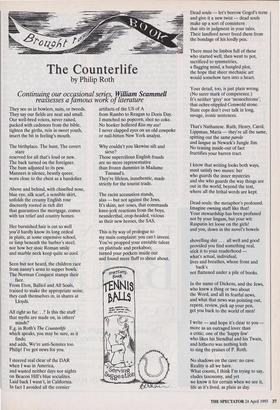The Counterlife
by Philip Roth
Continuing our occasional series, William Scammell reassesses a famous work of literature They see us in bowlers, suits, or tweeds. They say our fields are neat and small. Our well-bred voices, never raised, packed with cadences from the bible, tighten the girths, rein in sweet youth, insert the bit in feeling's mouth.
The birthplace. The hunt. The covert stare reserved for all that's loud or new. The back turned on the foreigner. The bum adjusted to its pew. Manners is silence, beastly queer, worn close to the chest as a bandolier.
Above and behind, with chiselled nose, blue eye, silk scarf, a sensible skirt, unfolds the creamy English rose discreetly rooted in rich dirt that guarantees the mortgage, comes with tax relief and country homes.
Her burnished hair is cut so well you'd hardly know its long ordeal in plaits, at some expensive school, or limp beneath the barber's steel; nor how her stoic Roman smile and marble neck keep quite so cool.
Seen but not heard, the children race from nanny's arms to supper bowls. The Norman Conquest stamps their face.
From Eton, Balliol and All Souls, trained to make the appropriate noise, they cash themselves in, in shares at Lloyds.
All right so far...? Is this the stuff that myths are made on, in others' minds?
E.g. in Roth's The Counterlife which speaks, you may be sure, as it finds; and adds, We're anti-Semites too. Philip! I've got news for you.
I steered real clear of the DAR when I was in America, and wasted neither days nor nights on Beacon Hill's blue socialites. Laid back I wasn't, in California. In fact I avoided all the cornier artifacts of the US of A from Rambo to Reagan to Doris Day. I munched no popcorn, shot no coke. No hooker hollered Kiss my ass!
I never clapped eyes on an old cowpoke or nail-bitten New York analyst.
Why couldn't you likewise sift and sieve?
Those supercilious English frauds are no more representative than frozen dummies in Madame Tussaud's.
They're lifeless, inauthentic, made strictly for the tourist trade.
The racist accusation stands, alas — but not against the Jews. It's skins, not noses, that commands knee-jerk reactions from the boys, neanderthal, crop-headed, vicious as their new heroes, the SAS.
This is by way of prologue to my main complaint: you can't invent. You've propped your enviable talent on platitude and peekaboo; turned your pockets inside out and found mere fluff to shout about. Dead souls — let's borrow Gogol's term and give it a new twist — dead souls make up a sort of comintern that sits in judgment in your tales. Their landlord never freed them from the bondage of his lordly pen.
There must be limbos full of these who started well, then went to pot, sacrificed to symmetries, a flagging mind, a bungled plot, the hope that sheer mechanic art would somehow turn into a heart.
Your detail, too, is just plain wrong. (No surer mark of competence.) It's neither 'grey' nor 'monochrome', that ochre-stippled Cotswold stone. State cops don't ever talk in long, savage, ironic sentences.
That's Nathanese. Ruth, Henry, Carol, Lippman, Maria — they're all the same, spitting out the same parole and longue as Newark's Jungle Jim.
No teasing inside-out of fact fructifies your barren tract.
I know that writing looks both ways, must satisfy two muses: her who guards the inner mysteries and she who guards the way things are out in the world, beyond the text, where all the lethal words are kept.
Dead souls: the metaphor's profound. Imagine owning stuff like that! Your stewardship has been profaned not by your lingam, but your wit: Rasputin let loose on the girls! and you, down in the novel's bowels shovelling shit . all well and good provided you find something real, stick it to your readerhood what's actual, individual, lives and breathes, whose front and back's not flattened under a pile of books.
In the name of Dickens, and the Jews, who knew a thing or two about the Word, and all its fearful news, and what that news was pointing out, repent, review, pick up your pen, get you back to the world of men!
I write — and hope it's clear to you more as an outraged lover than a critic; one of the 'happy few' who likes his Stendhal and his Twain, and hitherto was nothing loth to sing the praises of P. Roth.
No shadows on the cave: no cave. Reality is all we have.
What counts, I think I'm trying to say, eludes taxonomy, and yet we know it for certain when we see it, life as it's lived, as plain as day.


























































 Previous page
Previous page